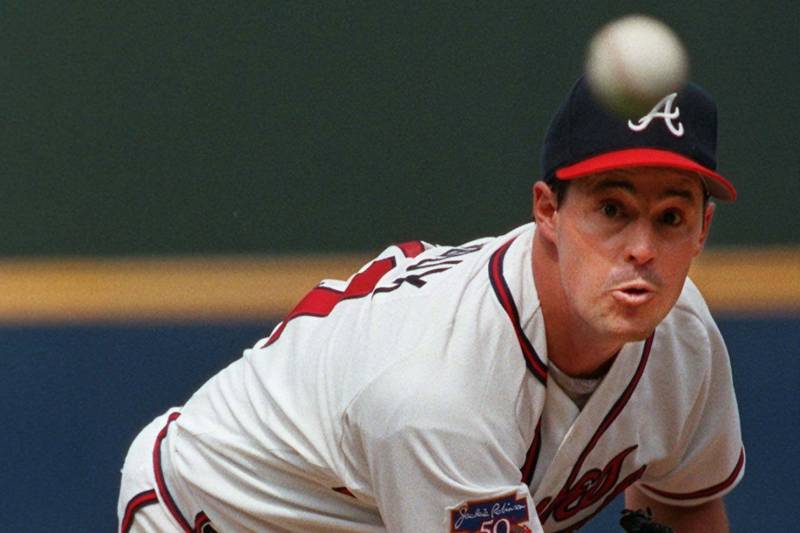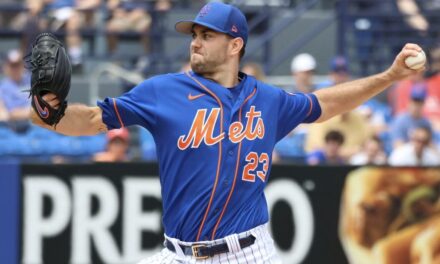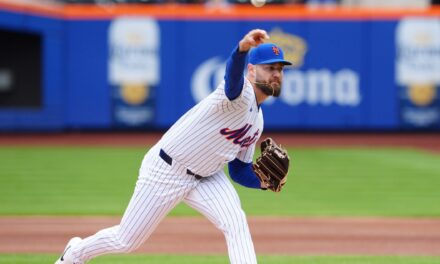
A hitter digging into the batter’s box sixty feet, six inches away from Greg Maddux might not initially be intimidated.
After all, Maddux was listed at six-feet tall and one-hundred seventy pounds, never relying on blazing fastball velocity to put hitters away. “The Professor” often wore glasses off the mound, which almost emphasized his unassuming persona.
However, what Maddux, 56, lacked in velocity he made up for with impeccable command, late movement and changing of speeds.
The Hall of Fame righty pitched to contact, despite his 3,371 career strikeouts, relying on guile to carve up hitters and navigate through lineups at will.
Blessed with good health and longevity, Maddux was the epitome of a workhorse. The eight-time All-Star tossed 200+ innings in 18 of his 23 major league seasons, and went an incredible fourteen consecutive years of 200+ innings pitched from 1988 through 2001. Only Don Sutton (20), Phil Niekro (19) and Cy Young (19) posted more seasons with 200+ innings pitched.
His 5,008.1 career innings pitched are the thirteenth-most in major league history, and that doesn’t include the additional 198 innings he tossed in the postseason (the sixth-most postseason innings pitched of all time).
Maddux’s propensity for pitching deep into games, and on seemingly so few pitches, is stuff of legend. So much so that baseball writer Jason Lukehart coined the term “Maddux” to highlight a start in which a starter tosses a complete-game shutout on fewer than 100 pitches. No pitcher has recorded more such starts since 1988, the first year of accurate pitch-count tracking, than Maddux with 13.
In that same span, Maddux has recorded 72 starts where he went at least eight innings and threw fewer than 100 pitches. To put that in greater perspective, if you took the six pitchers with the highest number of aforementioned games pitched since 2010, they’d still be three games shy of Maddux’s total since ’88.
Since the inception of the Cy Young Award in 1956, only four pitchers have won the honor at least four times: Roger Clemens (7X), Randy Johnson (5X), Steve Carlton (4X) and Maddux (4X). Of those pitchers, Johnson and Maddux are the only two to win four-straight Cy Young Awards, with Maddux taking home the hardware from 1992-1995.
The Cy Young Award wasn’t the only piece of hardware Maddux took home in 1995, as the Braves won their first World Series since 1957. Maddux posted a 2.84 ERA over five starts that postseason, with a 1.88 ERA in his three starts that included the National League Championship Series and World Series.
Despite the shortened season in ’95 due to the strike that began in August 1994, Maddux posted a 19-2 record, leading all qualified pitchers in ERA (1.63) and WHIP (0.811) while second in fWAR (7.9).
Hitters were rarely given free passes from Maddux, as the control artist was simply masterful on the mound. In fact, of his 740 career starts, Maddux allowed no more than one walk in 463 of them (63% of his total starts), which is the most such starts in major league history.
The Maddux household no doubt features a large trophy case, as the 355-game winner not only won four Cy Young Awards and a World Series ring, but also 18 Gold Glove Awards, the most of any player. That included a stretch of 13 straight years of taking home a Gold Glove Award from 1990 to 2002.
Mets fans were well aware of Maddux’s brilliance, as the righty made 66 career starts against the club. Only Steve Carlton made more career starts against the Amazins’ (76). The Mets were the opponent Maddux faced the most during his career, as he went 35-19 with a career 3.36 ERA in 428.1 innings pitched.
What makes Maddux’s career even more impressive is the fact that he pitched during the height of the steroid era, and yet, still excelled on the mound. No pitcher recorded a higher fWAR in the nineties than Maddux (69.8), while he posted the second-lowest HR/9 among qualified pitchers with a 0.42 mark.
Since retiring from the game following the 2008 season, in which he tossed 194 innings and won his final Gold Glove in his age 42 season, Maddux has kept busy. He’s worked as a special assistant in the front offices for the Chicago Cubs, Los Angeles Dodgers and Texas Rangers, and served as a volunteer pitching coach for the University of Nevada, Las Vegas while his son, Chase, pitched for the team.
Maddux is back with the Rangers this spring, brought in as a special instructor and aiding his brother Mike Maddux, who was hired as the team’s pitching for a second stint this past offseason.
Following his work with the Rangers this spring, Maddux is gearing up to host a celebrity poker tournament at Circa Resort and Casino in Las Vegas from April 28-30.
The three-day event, which includes the poker tournament, private dining experience and party, is partnered with the Baller Dream Foundation, a nonprofit founded in 2020 that provides various levels of support to alleviate stressors families encounter when dealing with cancer.
Maddux’s daughter, Paige, is the Foundation’s Regional Program Director, having previously worked at Rady Children’s Hospital-San Diego as the Director of Philanthropy for over five years.
Throughout his legendary playing career and beyond, Maddux and his family have donated considerable time and money to help many different causes. After running a celebrity golf tournament for two decades, Maddux is more than happy to lend his time and celebrity stature for a great cause.
Maddux is indeed a Hall of Famer both on and off the field.
I had the privilege of speaking with Maddux during spring training, where he discussed his game preparation, individuals who aided in his development and the upcoming celebrity poker tournament.
MMO: Who were some of your favorite players growing up?
Maddux: All the Reds. I grew up a huge Reds fan, so it was Pete Rose, Joe Morgan, Tom Seaver, George Foster and Tony Pérez.
MMO: From past interviews you’ve given, along with your Hall of Fame speech in 2014, one individual you give a lot of credit to early on in your career was Ralph Meder, who was a former big league scout and local Nevada coach. What did Meder impart on you?
Maddux: He taught me my pitching fundamentals which is movement is better than location; location, change of speeds and then velocity.
We learned how to throw a ball with movement on it, sink, run and all of that, as opposed to see how hard we could chuck it.
MMO: Did you grow up throwing what would be your signature two-seamer?
2+ Minutes of Greg Maddux's Front Door Two Seamers. 🤩 pic.twitter.com/h2H2NIxPKy
— Rob Friedman (@PitchingNinja) January 12, 2023
Maddux: That was what I threw growing up. Mr. Meder taught me that when I was about sixteen.
When I first started working with him that was one of the first things he changed. He changed my arm angle from straight over the top to kind of a three quarter-ish type thing. He was trying to teach me a fastball with the most movement.
He kind of changed the arm angle a little bit. I started throwing two-seamers and it started sinking and moving.
MMO: Was that also the same time that you started focusing on locating your pitches to both sides of the plate?
Maddux: That was later on, I started to learn that in A ball. Jim Wright was the first coach that kind of challenged me to throw a glove-side fastball down and away to righties or into lefties, and keep my movement on that as well.
That was the one thing I worked on my whole career. I remember that was the big thing for me was to be able to locate my fastball on both sides of the plate with the same type of movement.
MMO: You debuted with the Chicago Cubs at a very young age (20 years, 141 days old) and had some growing pains your first two seasons. You’ve talked about how going to winter ball one offseason and working with Dick Pole (Cubs’ minor and major league pitching coach) really helped with your changeup and ability to “work slow.” Can you expand on that?
Maddux: The reason I was 6-14 (in 1987) was I didn’t know how to pitch slow. My fastball was okay and my health was good, but I wasn’t changing speeds properly.
I went to winter ball and worked with Dickey on my changeup. That got a little more consistent along with the command of my fastball and then I was able to have a chance to get hitters out in the big leagues.
MMO: What memories stand out from when you hit free agency following the 1992 season?
Maddux: At first, I was a little upset; I kind of got fired in Chicago. They kind of kicked me out and I ended up going to Atlanta and got to play with some of the best pitchers in the game and played for one of the best managers in the game. It was a great experience.
I think we won all eleven years that I was there, and they won a couple before and after me. It was just a great experience, great people and created friendships with my teammates and neighbors. It couldn’t have been better.
MMO: There’s so much expanded technologies and improved analytics to better serve organizations and players in today’s game. You were such a student of the game and I’m curious, how would you go about studying and preparing for a start?
Maddux: I’d probably do it the same way: use the analytics to my advantage. The bottom line is you have to pitch with what you got.
I understood myself as a pitcher and things I could and couldn’t do with the baseball, the pitches I could and couldn’t throw. I’d grab some stuff out of it that would probably help me with my pitch selection.
And a lot of the stuff I wouldn’t listen to. I didn’t have a very good slider so if the hitter has a very low average on sliders, I probably still wouldn’t throw them man. I’d stick to my strengths and try to get them out the way that was best for me.
MMO: You own the most Gold Gloves of any player with 18. Were you someone that always took defense seriously and worked a lot on PFPs?
Maddux: One hundred percent. It’s part of the game and I felt like if I could make 90 plays a year, that’s thirty innings of scoreless baseball. I looked at it that way.
If I made all the plays I was supposed to make then my team had a better chance to win, and I had a chance to have a lower ERA when the season was over.
MMO: You tossed 200+ innings in 18 of your 23 major league seasons, including 14 consecutive seasons. What do you attribute your success to staying so healthy and being so consistent for the majority of your major league career to? How important was Keith Kleven (physical therapist/athletic trainer) and his program for your longevity?
Maddux: Keith Kleven helped me out a lot with being able to take care of my shoulder, elbow, legs, everything.
A lot of it was just good luck, a lot of catching a break. Never taking one off the arm or the foot where you break something or twist a knee sliding into second.
A lot of it was just good luck but I did take care of myself, and I tried to prepare myself to pitch over 200 innings every year.
MMO: Did you work with Kleven throughout your whole career?
Maddux: I worked with him from high school all the way until I was done playing.
MMO: I find the mental side of the game so interesting and obviously so crucial to success. I spoke with Bob Tewksbury – who is now a mental skills coach – and he sung the praises of Harvey Dorfman. Did you work with Dorfman during your career, and if so, how did he help you?
Maddux: Absolutely. Harvey was a big part of it. Harvey enabled me to think properly, worry about the things I could control, stuff like that. He helped me a lot off the field with my family life and just how to treat people and teammates. I was very lucky to have him.
MMO: Tewksbury spoke about how he would use visualization techniques on the mound to reset and help clear his head. Is that a technique you utilized?
Maddux: Yeah, absolutely. You had to be able to think properly and you had to recognize when you were nervous and realize that you could still think and pitch when you were nervous. Harvey helped me out with that.
I did do some visualization. You always had a certain couple of pitches that you would go back to. Pitches you threw the right way and just get a quick little snapshot of that before you started your delivery.
MMO: In an interview you gave with MLB Network a few years back, you were discussing some of the differences between your era of pitching and today’s pitchers. I was really fascinated by your quote in which you said, “I tried to get hitters out in the strike zone. I think the majority of pitchers today try to get hitters out, out of the strike zone.” Can you expand a bit on what your pitching philosophy was and how it was so effective for you?
Maddux: My philosophy was to try to keep it in front of the outfield. Very simple. I felt like the team that keeps the ball in front of the outfield the best is the team that’s going to win. It’s going to probably happen in just about every spring training game down here and about every game once the season starts.
The philosophy today is they seem to be looking for guys who get hitters to swing and miss, they want no contact. I think that’s why you see the higher pitch counts and that kind of limits the innings the guys are able to throw once the season is all said and done.
MMO: On an individual basis, was there a season or two that stands out in your mind as your best?
Maddux: Obviously, the 1995 season when we won the World Series. That one stands out more than all the others because we won, we finally got that ring. That was a pretty special year.
Your first year is pretty special and when you first get called up, but easily the ’95 season.
MMO: What memories do you have from facing the New York Mets and pitching at Shea Stadium?
Maddux: I loved pitching at Shea Stadium. It was a great atmosphere and great place to pitch. Really great golf courses when we weren’t pitching. I enjoyed New York.
It seems like the more you go back to New York the more you enjoy it even more each time. That was one of the places that kept getting better and better with more time you spent in it.
We played the Mets tough it seems, especially with Atlanta. We had a lot of success against them so obviously we had more fun playing them.
MMO: And you were close to playing in New York, with the Yankees, when you hit free agency in 1992, is that right?
Maddux: Yeah, real close. I thought I was going to go there and then Atlanta jumped in at the last second.
Back then there was no Interleague [play], and I knew the National League and I enjoyed hitting and running the bases. I liked the strategy better in the National League. I’d rather face the pitcher than the DH. Those were some of the big reasons why I stayed in the National League.
MMO: Do fans still bring up the “Chicks dig the long ball” commercial you appeared in with Tom Glavine?
Maddux: I still hear that from time to time. We both had won a Cy Young or two at the time and no one really knew who we were. And then we did that commercial and all of a sudden people knew who we were. It was a lot of fun doing that.
MMO: Tell me about the celebrity poker tournament you’re hosting at the end of April. How did you get involved and what can folks expect from the three-day event?
Maddux: My daughter works for the Baller Dream Foundation and it’s her gig. She asked if I would do it and I said yes.
I used to run a charity golf tournament for about twenty years, and we no longer do that. She’s doing all of the work, all I have to do is show up and try to round up some celebrities.
It’s for a good cause, I’ve been to a few of her events. The Baller Dream Foundation helps kids with cancer. They do stuff for them and they help older kids and younger adults. They raise money and they take them on fun trips and things they would like to do, I hate to say it, but before it’s too late.
If they want to go to a ballgame in Seattle or go fishing in Alaska or go to Disneyland, they make sure all their family get to go and everything as well.
MMO: Is this your first event with the Baller Dream Foundation?
Maddux: It’s the first event I’ve done with them. I’ve supported them for probably the last two or three years. But as far as actually running an event it’s the first one. It’s also the first one with Circa in Las Vegas.
MMO: You’ve donated a lot of time and money to charity. How long have you been giving back in that capacity, and what does it mean to you and your family?
Maddux: It’s pretty cool. I think we started giving back as soon as we had enough money to give, I’m sure like most people. I think before we had money we gave time and when you have the resources to give back, we’re more than happy to do that and give some time as well.
We’ve usually supported mostly charities in Las Vegas; we like to keep it in the neighborhood. It’s what you do, you always give back. You’re given so much that you like to give back when you can.
MMO: Are you a good poker player?
Maddux: Not really. If I sat down at one of the games in Vegas and if there were ten people there, I might be better than one, maybe two. But they’re pretty good there. With my teammates I was pretty good.
MMO: Which celebrities will be attending this event?
Maddux: Goose Gossage, Wally Joyner, a couple hockey players from the Knights, Tito Ortiz, Roger Clemens, David Wells, Joe Staley, A.J. Cole, Evan Mathis, Derrek Lee, Kenny Lofton, Darren Banks.
We’ll still probably add a couple as we get nearby. You know how celebrities are, they don’t like to look too far in advance. [Laughs.]
MMO: You’re working with the Texas Rangers this spring as a special instructor. What are some of your duties with the club?
Maddux: I’m down here for about twenty days of spring training and it’s to help my brother pass off his philosophy to the pitchers. I spend time with the pitchers and try to get them to understand the importance of taking PFPs, defense, pitch selection and all of the little things that go around it.
Just kind of an extra coach for twenty days and trying to help out where I can.
MMO: Do you have any aspirations of getting back in the game on a full-time basis?
Maddux: I will say I’m enjoying the time down here. At the same time, I also enjoy retirement. I think we’re doing it the right way.
We did it right in our younger years and we’re starting to enjoy it now. With all the traveling and everything that we’ve been doing now, we’re going to see different parts of the world and enjoy retirement.
MMO: When you look back on your legendary career, what are you most proud of?
Maddux: Probably just the longevity of it and the success. I was able to do something I loved for a long time and enjoyed all 22 years of it. I enjoyed practice and never had to get a real job. I never had to grow up.
It’s pretty special being able to do it as long as I could.
MMO: Thanks very much for some time, Greg. It was great chatting with you.
Maddux: I appreciate it. Thank you.
Follow Greg Maddux on Twitter, @gregmaddux
For more information on the Baller Dream Celebrity Poker Tournament, visit here.















